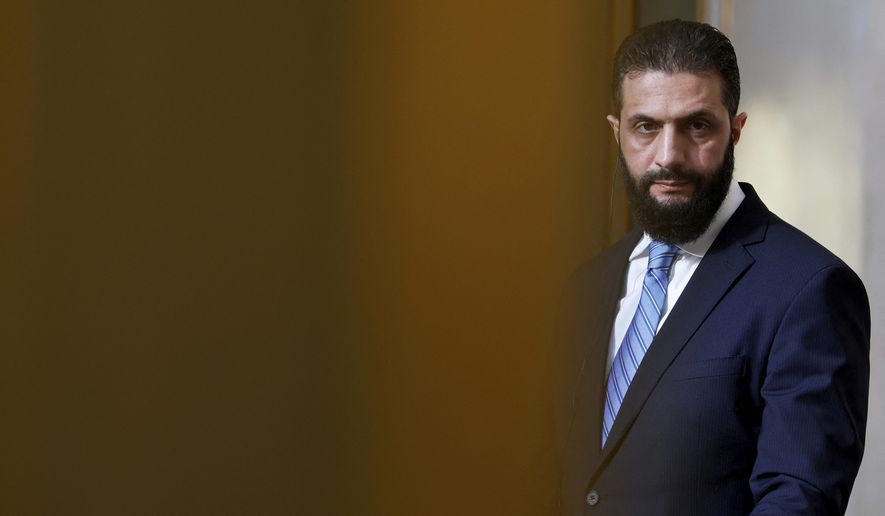OPINION:
Earlier this month, President Trump met with Syria’s interim president, Ahmad al-Sharaa. The meeting came just one day after Mr. Trump announced plans to lift U.S. sanctions on Syria — a sweeping reversal of more than four decades of U.S. foreign policy aimed at isolating the Assad regime.
The reversal is a wise one. Syria’s brutal dictator Bashar al-Assad is gone. Its transitional government has distanced itself from Iran and Hezbollah and is seeking engagement with the United States. By extending a hand rather than turning our back, we ensure American influence in a region where adversaries like Russia and Iran would otherwise fill the void.
Syria is trying to rebuild in the aftermath of a long civil war. U.S. sanctions — crafted to confront the now-defunct Assad regime — have strangled Syria’s economy. The average monthly salary is just $10 to $20. Electricity is available for only a few hours a day. Millions of people remain displaced in refugee camps.
A starving, jobless population creates chaos, not stability. In recent weeks, fighters linked with the Assad regime have clashed with transitional forces in Syria’s coastal provinces. Those skirmishes raise the specter of renewed sectarian violence.
A failed Syria is a direct threat to American security. We’ve seen as much before in Libya and Somalia. When economic collapse leads to lawlessness, extremist factions move in. Destitute citizens do not stay neutral. They side with whoever offers relief first, whether that’s an extremist group, the United States or one of our geopolitical adversaries.
For decades, Syria has effectively been a client state of Iran and Russia. But Syrians who once saw Moscow and Tehran as protectors increasingly resent them for propping up the Assad regime. They want a new path. Many are looking to the United States. But should we continue to treat Syria as a pariah, we’ll push it right back into hostile hands.
Lifting sanctions costs us nothing. It doesn’t require sending foreign aid or committing U.S. resources. Several Gulf states are eager to invest in Syria’s recovery, but our sanctions essentially block them from doing so.
In other words, U.S. sanctions don’t just keep Syria poor; they prevent willing allies from stabilizing it.
China, meanwhile, has expanded its influence in the region. It’s offering reconstruction loans and infrastructure deals to any government willing to accept them. Without U.S. movement to normalize relations with Syria, Beijing will fill the void.
Some in Washington have expressed skepticism about Syria’s new leadership. That’s understandable. Some officials have complicated pasts. But this government has already done two things Mr. Assad never did: It has severed Iran’s weapons pipeline to Hezbollah and pushed Iranian forces out of Syrian territory. These are just a couple of reasons why Mr. Trump believes the country has “a real shot of pulling it together.”
Would every member of this new leadership pass a background check and a security clearance? Certainly not. But as this administration has rightly pointed out, foreign policy shouldn’t be about purity tests. The only thing our leaders should be unequivocal about is putting America’s interests first.
It’s notable — and commendable — that the White House has prioritized normalizing relations with Syria, even amid a packed foreign policy agenda in its first 100 days, from Ukraine and trade tensions to Gaza and Iran. This administration seems to understand that foreign policy doesn’t pause for convenience.
Last month, I accompanied two U.S. members of Congress — Cory Mills of Florida and Marlin Stutzman of Indiana — on a trip to Syria, marking the first congressional delegation to visit the country in years. We saw firsthand a nation weary of conflict, yearning for stability, and increasingly open to reengagement with the U.S.
Mr. Trump rightly recognizes that many Syrians seek a future shaped not by Russia or Iran, but through engagement with the West.
U.S. foreign policy must evolve with our interests, not remain bound by outdated doctrine. Lifting sanctions and supporting Syria’s economic recovery is a smart step to strengthen America’s influence, and it deals a strategic setback to our adversaries. Now it’s up to Syria’s local government to utilize this historic opportunity that Mr. Trump gave to implement great governance, equality, citizenship, peace and prosperity.
•Tarek Kteleh is a practicing medical doctor, chairman of the Syrian American Alliance for Peace and Prosperity and the president of Rheumatology of Central Indiana. He is the author of “The Six Pillars of Advocacy: Embrace Your Cause and Transform Lives.”




Please read our comment policy before commenting.